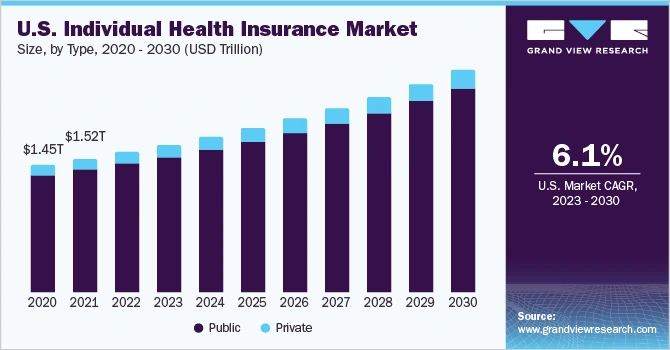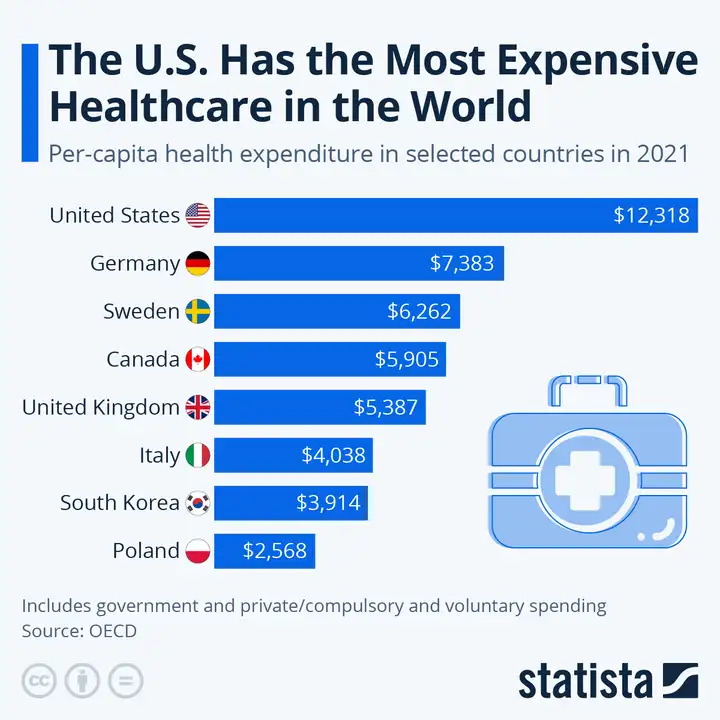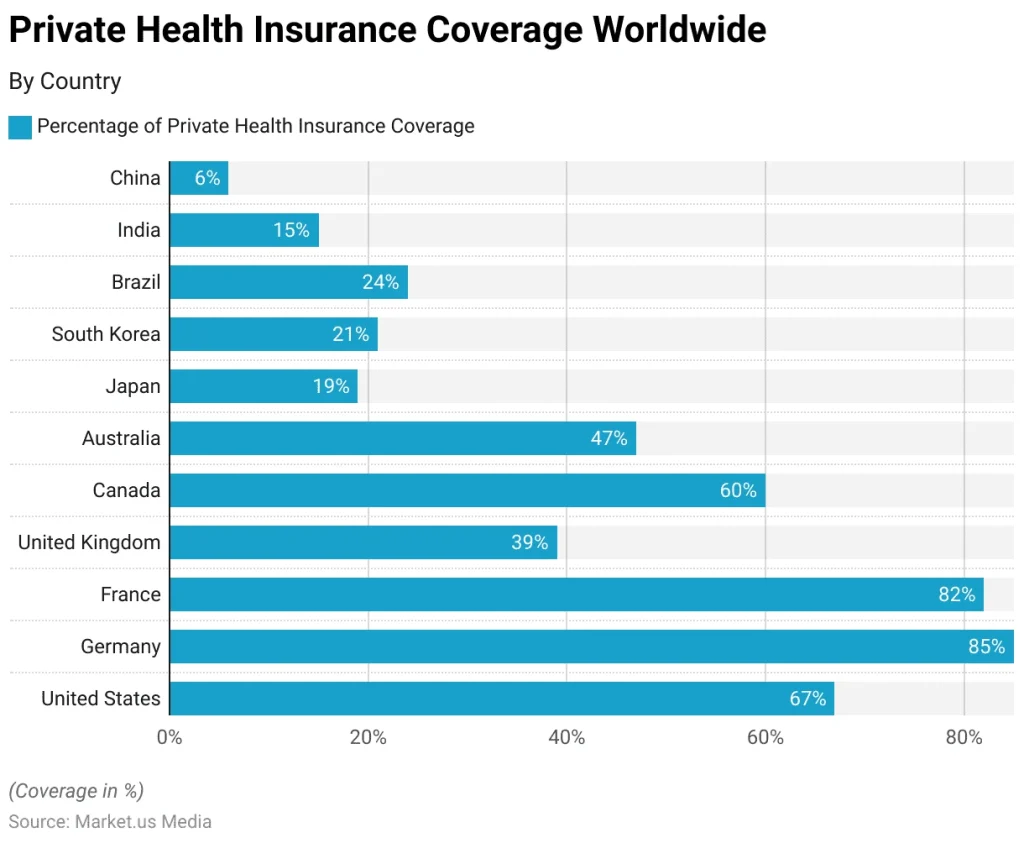Private healthcare has long been a significant player in the US healthcare system. Unlike public healthcare, private systems don’t rely on public funding or government regulations. Instead, they operate independently with direct payments, insurance, and employer-sponsored plans.
Spending on both private and public health care systems in the USA is on the rise. In fact, private health insurance expenses grew by 11.5%, reaching $1.46 trillion, which is equivalent to 30% of all national health expenditures.
While the private health system isn’t for everyone, executives, employers, and corporate leaders usually choose it for its customization, high level of quality, and efficiency. These are only the tip of the iceberg when it comes to the system’s benefits.
With the integration of concierge healthcare services, the private healthcare landscape has become a premium, tailored medical experience with on-demand physician access, care coordination, and preventive health strategies designed to meet the needs of busy professionals.
But what is private healthcare and how does it work? In this guide to private healthcare systems, we’ll dig deeper to understand its structure, benefits, and future. Let’s get started.
What Is a Private Healthcare System & How Does it Work?
A private healthcare system consists of healthcare services provided by privately owned hospitals, clinics, and medical centers. It is primarily funded through private health insurance, out-of-pocket payments, employer-sponsored plans, employee health benefits and membership medicine programs.
While private healthcare providers are usually pricier, they also offer premium benefits like not having to wait too long for an appointment and accessing cutting-edge treatments.

Key components of private healthcare systems
To help you fully understand the processes and components of private healthcare, let’s talk about the facilities that operate within it, the payment models patients can use, and more. Here’s how private health care works.
Healthcare Providers & Facilities
The US private healthcare system includes many diverse types of providers from private hospitals and clinics to specialized medical centers that operate both in for-profit and non-profit structures.
Many private hospitals and facilities use advanced diagnostic technologies and offer complex surgeries. Since these are not available in public systems, private providers sometimes partner with larger healthcare networks to give more patients access to specialized care.
Insurance & Payment Models
The costs of private health care make the system stand out. There are usually 3 payment models available, including private insurance, which covers preventive health and routine care, employer-sponsored plans, which offer broader coverage, and direct payments, whereby patients cover their own costs for premium services like personalized concierge medicine.
Specialized Services & Advanced Care
Private healthcare usually thrives in terms of specialized treatments and superior care options like preventive care. Using cutting-edge medical technologies, providers within these systems can do quicker consultations, better diagnostics, surgeries, and follow-ups.
Competition between providers
In the private healthcare market, medical providers usually need to compete with each other to attract new patients and insurance companies. This ambition leads to more innovation and discoveries of better healthcare delivery methods.
The Pros and Cons of Private Healthcare
From quicker access to specialists and individualized treatment programs catered to each patient’s needs, the benefits of private healthcare are many. Yet, the system also has its disadvantages, particularly in terms of accessibility and costs.
If you’re considering putting your health in the hands of the private healthcare system, you’ll need to weigh both its pros and cons to make an informed decision, so let’s start dissecting it.

Benefits of Private Healthcare
While the benefits of private health care are too many to count on one hand, we’ve gathered the 5 most valuable advantages you should know about. Let’s talk about them and understand why private healthcare is worth the investment.
1. Faster Access to Care
Private healthcare works faster and more efficiently. Within this system, wait times are reduced, enabling patients to visit specialists and have diagnostic testing completed more quickly. This is an especially valuable benefit for executives and busy professionals who need immediate, efficient medical attention.
2. More Provider Choice
Instead of being assigned providers within a public network, patients are free to select the physicians, hospitals, and treatment regimens that best suit their specific health needs.
3. Advanced Treatments
Private facilities often provide state-of-the-art care options that would not be accessible in public systems. They are usually the first to adopt new technologies and creative treatments, helping them be more competitive in terms of quality and service.
4. Preventive & Personalized Care
Private healthcare offers personalized medical care plans that cater to each patient’s needs, with an emphasis on wellness and prevention. Using proactive screenings and even genome testing, this preventive medicine model lowers long-term risks of developing health problems.
5. Employer-Sponsored Plans
As part of their corporate health benefits, many companies offer private healthcare options to their executives. This not only helps them improve employee retention, productivity, and overall job satisfaction but also helps them attract top talent.
Challenges and Disadvantages of Private Healthcare Systems
The disadvantages of private healthcare system aren’t too many, and they don’t outweigh its benefits. Still, they are worth keeping in mind when debating whether to join the world of private medicine or not. So, let’s cover them as well.
1. Costs
All the advanced diagnostics and premium quality of care within the private healthcare system come at a cost. Insurance usually doesn’t cover the full extent of subscription medical care plans, so out-of-pocket expenses are likely to appear.
You should also consider the premiums and deductibles of your private insurance to get the full picture. While affordability is a real concern, the quality of private healthcare truly speaks for itself. To those who value their health above all, this investment is undoubtedly worthwhile.
2. Potential for Exclusions & Limitations
Private insurance isn’t an all-inclusive deal. There will be instances where certain surgeries, experimental therapies, and pre-existing conditions will not be covered by certain private insurance plans. So, before you choose a provider, make sure that you know every detail about your insurance policy.
Having covered the advantages and disadvantages of private health care, let’s understand the other side of the story. If you don’t choose private healthcare, where does it leave you?
Key Differences Between Private vs Public Healthcare
When you’re debating going private to manage your health, you’ll also need to understand the details of public healthcare. Why should you make the switch and what differentiates private vs public healthcare systems? Let’s compare and help you make an easier decision.
| Private Healthcare | Public Healthcare | |
|---|---|---|
| Cost | Higher costs, usually covered by private insurance | Lower costs funded by taxes |
| Accessibility | Faster access to specialists | Long wait times |
| Provider Choice | Patients choose providers | Limited public network options |
| Quality of Care | High-quality, innovative care | Standardized care |
| Services | Comprehensive range of specialties | Basic and essential services |
| Urgency | Faster for non-emergency procedures | Slower for non-emergency procedures |
How Much Does Private Health Care Cost?

The price you pay for private healthcare depends on many factors including your insurance plan details, the provider you choose, the level of coverage, your location, the types of medical services you need, and more.
If you’re choosing a premium provider with 24/7 global access to a concierge doctor, you will be paying an annual retainer and some ongoing medical expenses. However, if you choose a more basic provider that offers better diagnostics, your costs will consist of:
- The policy premiums of your private insurance
- Deductibles before the start of coverage
- Co-pays for tests, prescriptions, and doctor visits
- Other out-of-pocket costs that insurance doesn’t cover
As of 2025, 65.4% of Americans are covered by private insurance. While these plans can pay for some part of private healthcare costs, there’s still a reason why US medical costs are stereotypically high.
If you have an employer-sponsored plan or subscription medical care, you can lower your individual costs. However, if you go with direct-pay and concierge models, you’ll pay higher upfront but experience more access and flexibility.
Concierge Medicine & Private Healthcare Systems
Private healthcare systems have a broader range of providers that take medicine to the next level. One of the brightest examples of this is the incorporation of concierge medicine and executive healthcare into the private health systems. It serves as an alternative to traditional insurance-based models.
But how and why does this combination work? Concierge medicine works on a membership or direct-pay basis. It promises patients immediate, unrestricted access to physicians without the limitations that come with traditional insurance networks.
To help you understand the main reasons why patients choose concierge plans like the ones we offer here at WorldClinic, let us tell you about some of its key features.
- 24/7 global access to certified concierge doctors who offer immediate care.
- Personalized health plans that are tailored to your medical history, genetics, and health goals.
- Preventive and wellness-focused care that puts proactive health management under the spotlight.
- Seamless care coordination across specialists with reduced delays and better treatment outcomes.
Within the private healthcare system, the future of concierge medicine is bright, particularly among corporate health plans. Employers are now offering better employee benefits because it helps with employee retention and reduces absenteeism. Concierge medicine ideally aligns with their needs for top-tier care.
Trends and the Future of Private Healthcare
The current landscape of private healthcare is undergoing exponential growth thanks to new technologies and innovative models.
As we look forward, these advancements have no intention of stopping. So, let’s talk about some of the trends that are shaping how modern healthcare is delivered.
Technology-Driven Personalized Healthcare
While technology is used even today, the future holds great promise for new advancements. From wearables and genetic testing to AI-based analytics, innovations will continue to make diagnostics more accurate and treatments more personalized.
Virtual and Telemedicine Services
Telemedicine is used in concierge medicine but its adoption across the whole private and public healthcare systems is on the rise. The benefits of telemedicine range from remote consultations to online healthcare delivery, making the patient’s whole medical journey more accessible and convenient.
The Use of AI in Concierge Health Management
AI is taking over industries across the world, and healthcare isn’t an exception. AI tools will start supporting preventive care models in concierge health management by finding risks earlier on, continuously monitoring health metrics, and optimizing health plans on the go.
Conclusion
Faster access to specialists, individualized care, and cutting-edge treatments are just a few advantages of private healthcare systems. However, they also have drawbacks, especially when it comes to accessibility and expense.
Understanding the private healthcare system, its providers, cost structures, and other features is key to making an informed decision.
One of the best ways to take advantage of all private healthcare benefits is to combine it with concierge medicine services. They offer 24/7 global access to certified physicians, tailored health plans, care coordination, and more.
Here at WorldClinic, we offer concierge medical services tailored to meet the demands of executives and busy professionals. If you’re ready to access top-tier healthcare for you, your family, and your employees, don’t hesitate to explore our membership plans. Contact us if you have any questions and stay healthy!
FAQs About Private HealthCare Systems
1. Is private health care worth it?
For anyone who values personalized care, fast access to healthcare, and cutting-edge treatment options, private healthcare is worth its price tag. One of the only disadvantages of private healthcare is its price, making it an ideal investment for high-net-worth individuals and executives.
2. Why is private healthcare better?
Private healthcare is the best option for patients who value effectiveness and quality because it offers premium medical services, better provider selection, and shorter wait times. However, private medicine isn’t perfect for everyone’s needs, so take your budget and health needs into account before making a decision.
3. Can you get private healthcare in the US?
Absolutely. There is a huge range of private healthcare options in the US, from concierge medical to insurance-based plans. Within this network, you are in charge of choosing your provider and funding is provided through insurance, corporate plans, or out-of-pocket costs.
4. How many people in the US use private healthcare?
Around 65% of Americans have private insurance coverage. However, private healthcare costs aren’t fully covered by insurance, meaning that some treatments must be paid for out-of-pocket.
5. Who pays for private healthcare?
Usually, a mix of out-of-pocket expenses, employer-sponsored benefits, and private insurance cover the costs of private healthcare.


